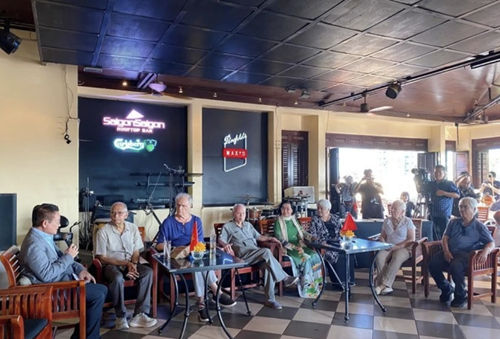Painful memories
On the metro from the centrer to the outskirts of Ho Chi Minh City, David Devoss, shared that in 1972, when he was a reporter for New York Times, he was assigned to cover the war in Vietnam. During nearly three years of working on the battlefields from Sai Gon (now Ho Chi Minh City) to Tay Ninh, he witnessed many heartbreaking stories. The flames of war took the lives of many innocent people. Many children were orphaned, many families lost their loved ones.
    |
 |
|
International war correspondents at a gathering in Ho Chi Minh City |
Devoss recalled that while reporting on a fierce battle in An Loc (Tay Ninh), he was seriously injured, as many pieces of metal damaged his right knee, leaving him unable to walk normally forever. He continuously wrote many articles condemning the war, condemning the actions that harmed human life, because the losses in war could not be compensated for, he added.
Sharing the same memories of the pain and loss caused by war, another war correspondent for New York Times and Times Magazine, Tom Fox, told his story in Vietnamese: “Because I hated war, I was determined not to join the army. I went to Vietnam as a volunteer. I went everywhere in the South to help orphans and families who were poor due to the war. That is why I understand more deeply the pain caused by war.”
During his volunteering time, Fox began learning Vietnamese language and became a war correspondent so that he could tell the world about the hardships that the Vietnamese people were enduring.
Having covered the U.S. military withdrawal from Vietnam in 1973, Edith Madelen Ledever, the only one of the 47 war correspondents who return to Vietnam this time is still working as a journalist (she is currently the AP Bureau Chief at the United Nations), said that at that time, she was the only female war correspondent in Vietnam. After her, there were several other female colleagues who were sent to Vietnam by Associated Press (AP).
“Although we are women, we are not afraid to rush into the battlefield, reporting on all the hot spots. The heartbreaking thing was that compared to our hardships, the losses of the Vietnamese people were much greater. We are always troubled when remembering the painful memories of the war, when many of our Vietnamese friends and colleagues fell,” she recounted.
A shared love
Returning to Vietnam after half a century since April 30, 1975, the war correspondents recalled painful memories but their emotions are also mixed with happiness. They share a love for Vietnam, a beautiful country and tolerant people. After liberation, some war correspondents returned to Vietnam, married Vietnamese women, learned Vietnamese language and understood and loved this country more.
Tom Fox shared that he learned Vietnamese for five months after finishing his volunteer trip. He had read many Vietnamese literary works, especially poet Nguyen Du's Tale of Kieu, and gradually developed feelings for the country and people of Vietnam, so he returned to the South as a war correspondent.
"During my time as a war correspondent in Vietnam, I had the honor of meeting Pham Xuan An, a famous intelligence agent. It brought me the opportunity to meet my current wife, a girl from Can Tho. We have lived happily together for more than 50 years, with two children and three grandchildren. The love for Vietnam has never faded in my heart," he stated.
After Vietnam's liberation, David Devoss always wanted to return to An Loc, where he left one of his legs, but failed. It was not until 1990 that he returned to Vietnam to write about overseas Vietnamese families who had left the country in 1975 and returned home, developed their businesses and contributed to Vietnam.
"Vietnamese people are always gentle and hospitable. Vietnam recovered after the war but still faced many difficulties. That was in the 1990s. Now I see a completely different Vietnam which is more beautiful, and richer," Devoss added.
Having been in Vietnam to cover the anti-U.S. war, and the fight to protect the northern border, Jim Laurie, a former war correspondent for NBC News, recalled that he was one of the few war correspondents who witnessed the event of April 30, 1975. In his memory, there were images of tanks entering the city, and people poured into the streets to welcome the liberation army and share in the joy of the successful resistance war and the reunification of the country.
Perhaps, Laurie is one of the few war correspondents who have witnessed both wartime and peacetime in Vietnam. After liberation, he returned to Vietnam many times in 1986 (after the renewal), 2000 and most recently three months ago.
“I spent time traveling across Vietnam and witnessed the comprehensive changes after 50 years of liberation. Compared to what I witnessed during the war, Vietnam has gradually overcome its bomb-filled past and is developing more and more strongly,” he shared.
Like Laurie, Nayan Chanda, a war correspondent in Vietnam, decided to stay in the country after April 30, 1975 while his colleagues left one by one. Later, he wrote many articles and books about Vietnam. In his works, he always conveyed the message “The love of the Vietnamese people for their country is something the whole world should learn”.
Source: VNA